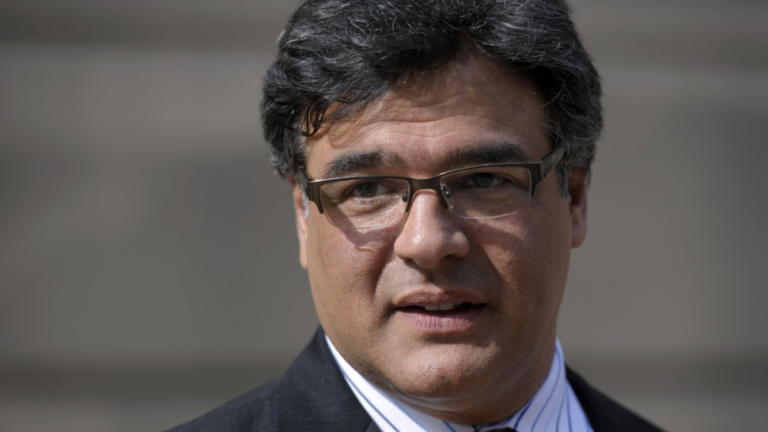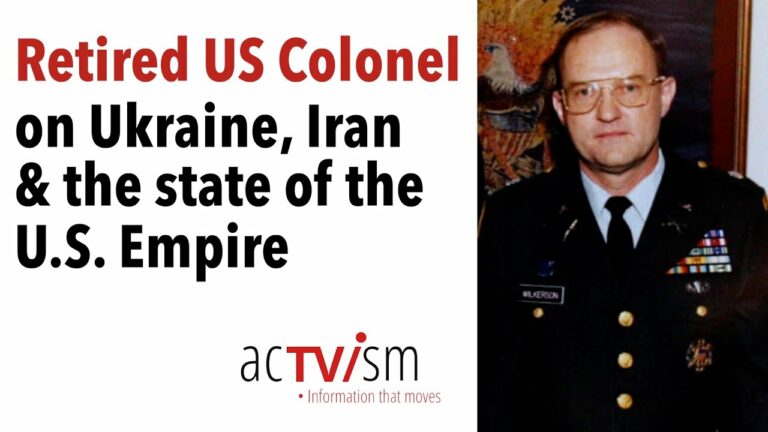This interview was originally published on October 15, 2014. Dr. Kumar says the roots of Islamophobia are to be found in a conflict between empires and economic interests, not a clash of civilizations.
PAUL JAY, SENIOR EDITOR, TRNN: Welcome back to Reality Asserts Itself. I’m Paul Jay. This is The Real News Network.
We’re continuing our series of discussions with Deepa Kumar, and she now joins us in the studio.
Thanks for joining us again.
DEEPA KUMAR, ASSOC. PROF. MEDIA STUDIES AND MIDEAST STUDIES, RUTGERS UNIV.: My pleasure.
JAY: So, one more time, Deepa is an associate professor of media studies at Rutgers University, and she serves as an officer of the teachers union, and her latest book is Islamophobia and the Politics of Empire.
Thanks.
So we’re going to talk about the history of Islam. And for those of you that haven’t watched the first couple of parts, you should, ’cause we’re kind of just picking up our conversation.
KUMAR: The first 300 to 400 years of contact with the Muslim empire, with the Muslim armies, isn’t seen as a specific threat to European interests. Norman Daniel, who’s the most influential scholar on this, calls this the age of ignorance, which is people in Europe really didn’t know anything about the religion Islam, and they didn’t see them as being a particularly important threat. They just saw them as yet another barbarian horde like the others that they had to deal with. Even though the Muslim armies are making incursions into Europe in the eighth century and so forth, they see them as just another threat that must be vanquished.
JAY: But if they see them as barbarian hordes, is that the beginnings of thinking of Islam as barbarian hordes? ‘Cause that’s part of the Islamophobia now; that’s kind of–that’s the vision.
KUMAR: Absolutely. But the sharp focus on Muslims as being barbaric and as being particularly demonic actually only happens in the 11th century in the context of the Crusades. And even then, the very first holy war wasn’t a holy war. It was about the papacy wanting to establish spiritual and political control over a united Christian Europe. And what better way to do it than to inflame a holy war and to extend its influence into the Byzantine Empire, or Eastern Rome, right?
And so it’s in that context that they start to commission studies of Islam in order to develop a propaganda. And, of course, the most horrific kind of propaganda is developed. The prophet Muhammad is–.
JAY: Back up one step, ’cause we’re going to show a map here. So the Byzantine Empire, Eastern Rome, this is where Islam emerges and starts to take over. So these were Christian areas.
KUMAR: Yes, these were Christian areas. But when they spread into the Persian Empire and into the Christian Byzantine Empire, very often, because of hundreds of years of conflicts between these two empires, people didn’t put up a fight. Sometimes they just welcomed them in. And when the Muslim armies took over and established their rule, they gave people a choice: you convert to Islam or you practice your own religion and pay a tax.
JAY: Now, if I’m correct–again, my history’s sketchy here, but Islam arises at a time of a great decline of the Persian Empire and a great decline of the Byzantine Empire. It’s actually really filling a kind of void.
KUMAR: That’s right. It’s filling a void. And it comes in as a young, energized force that is able–that offers revitalization in the region. And this is, of course, why people would start to convert from Christianity to Islam and so on. And when the conversion–this happens over a course of 100, 200 years, right? And so when that starts to take place, that’s when the European elite start to see Islam as an existential threat and they try to find ways to explain it. And so one of the explanations that’s given is, oh, people are converting to Islam because Islam allows men to take four wives. And so it’s because sexual indulgences are allowed; that’s why they are converting. It’s not about the religion. And the Prophet Muhammad is also seen as a cardinal of the Christian faith who tried to create his own branch, but because he couldn’t come to power that way, created another religion.
JAY: Well, if it wasn’t about having four wives, what was it about? Why was Islam so successful?
KUMAR: Well, because where they ruled, for the most part they ruled and brought prosperity. So if you look at the Iberian Peninsula, what’s known as Al-Andalus, which is the name given to the 700 or 800 year rule of the Muslims in Portugal, in Spain, and so on, they brought massive development–technological development, development in medicine; the standard of living of people really greatly rose; and you had street lighting and all the rest of it. So that’s why people, when they saw what these people could do, would convert.
JAY: And is it partly because Islam created a set of rules that gave more order to the society? What I’ve read both in decline of Persian and Byzantine empire, things had gotten very chaotic, like, in terms of there’s almost no rule of law in some ways.
KUMAR: Yeah. Actually, the sharia law–or sharia. Sharia law is a bit–you don’t–sharia means law. Sharia law was developed, actually, in the context of trying to administer a huge empire. And you needed to have rules, you needed to figure out everything about how a society functions. And therefore it was invented, to actually create some order out of the chaos.
JAY: And when they talk about clash of civilizations and this being Europe versus the Islamic Empire and then the Ottoman Empire, it’s not really about clash of civilizations so much. It’s about clash of empires.
KUMAR: Absolutely right.
JAY: So it’s about a class of economic interest.
KUMAR: That’s right. It’s completely about a clash of economic interests. It’s about the leaders, the political leaders in Europe versus the political leaders in the Middle East and so forth duking it out for power.
And the fact of the matter is that these leaders were not always against each other as well, because even in the context of the Crusades, you see alliances being made between the Crusader kings and the Muslim kings and people betraying each other for political gain, for economic gain. So there’s–the idea that somehow Muslims and Christians have always been at loggerheads with each other is simply not borne out.
JAY: The other thing we–in the first episode–if you haven’t watched it, go watch it, ’cause we talked about Bill Maher and Islamophobia and Maher’s comment about how our tradition is this liberal values and all this.
I mean, actually when you’re talking back in that period, you’re comparing the Spanish Inquisition, which was burning nonbelievers at the stake, to the Ottomans, who actually were extremely tolerant, from my understanding. I mean, I was in Albania and got to know the place a little bit, and if you just called yourself a Muslim if anyone asked and you paid taxes, I mean, you could have any pagan practice you wanted. There was no enforcement of religious doctrine that mattered.
KUMAR: That’s right. In fact, compared to the sort of climate of religious intolerance in Europe, right, at the end of the 15th century–Jews are expelled from Spain, as are the Muslims, and so on. And Jews actually traveled to live in the Ottoman Empire and progress in–you know, they actually experience progress in the region because it was a far more tolerant attitude towards religious diversity than being burnt at the stake.
JAY: Yeah. And in Europe, Catholics and Protestants are slaughtering each other for hundreds of years.
KUMAR: Absolutely.
JAY: This is not great liberal values.
KUMAR: No. That’s right.
JAY: Okay. So bring us forward.
KUMAR: And burning women at the stake, let’s not forget.
JAY: Yeah, witches. Yeah.
KUMAR: Yes.
JAY: So when does Islamophobia rear its head again in a serious way?
KUMAR: So the story that I tell in the book is that there isn’t one long stream of hatred between East and West in the clash of civilizations. Even during the time of the Crusades, you found different attitudes among Christians and Jews who lived in Al-Andalus. And then you see a complete dying down of these attitudes around 13th, 14th century. The rise of nationalism creates different attitudes, different enemies, and so on. And, in fact, there’s great admiration for the Ottomans, because the Ottomans, compared to Europe–and remember, Europe is just coming out of the Dark Ages, and they see this really advanced civilization, incredible political administrative system, and they want to be like them. They consider the Ottomans to be Europeans of a sort.
But what happens is that once the Ottomans are defeated, in Vienna, for instance, and once they start to go into decline economically and politically compared to Europe, where you see the rise of capitalism and technology and so on, that’s when there is the reemergence of these ideas, because there’s a sense in which Europeans are superior, and therefore the white man’s burden is to go off and vanquish these barbaric people.
JAY: And start colonizing the areas that were part of the Ottoman Empire.
KUMAR: Exactly. And so Edward Said, whose book Orientalism really charts the process by which a systematic body of knowledge is created to justifying empire, to justify European colonialism–.
JAY: Yeah, you’ve got to dehumanize those who you will either colonize or enslave.
KUMAR: Absolutely.
JAY: So let’s jump ahead through the 20th century. In the First World War and in the Second World War, much of the Islamic countries do side with the enemies of the West.
KUMAR: Yes, that’s true. And what is–?
JAY: I mean, does this kind of more modern roots of Islamophobia connect with the politics of both wars?
KUMAR: With the politics? Well, I mean, the Ottoman Empire, of course, sides not with the Allies and gets defeated, and then that becomes the basis from which to divide up the Ottoman Empire and create these arbitrary countries with the Sykes-Picot treaty, the infamous Sykes-Picot treaty.
JAY: Which people are talking about now because the Islamic State is trying to eliminate the border of–.
KUMAR: Exactly. Exactly. And so the entire map of the region is pretty much planned out by France and by Britain. And, of course, they establish the mandate system by which to control the particular territories that they have carved out.
JAY: And we have–culturally, ’cause I’m kind of interested in the cultural part of it, and so are you–you’ve got Lawrence of Arabia, which was, like, the movie that sort of–most people’s history of that period is because they saw Lawrence of Arabia.
KUMAR: Yes, yes. And that’s, of course, a different kind of white savior narrative, isn’t it, is that the barbarians can’t liberate themselves and you need the Lawrence of Arabias to go in and rescue them.
JAY: And everyone in that movie, I mean, all the Arabs in that movie, those characters keep reappearing.
KUMAR: Oh, yes.
JAY: Like, I think if you were to track all the various stereotype, you find every one in Lawrence of Arabia.
KUMAR: Absolutely. In fact, Hollywood actually inherits the cultural tropes that were developed in Europe in the 19th century in the context of colonialism, right? And so the kind of images that you see in the paintings of Gérôme or Delacroix and these incredible Orientalist painters, Hollywood develops that language so that, you know, a Jack Shaheen refers to this as an “Ali Baba kit”, which is you want to make a movie about the Middle East, you have a desert, you have a sheik or two, you have some camels and an oasis, and that’s all you need to know. And he’s quite right. Sex and the City 2 pretty much follows that stereotype down to the last letter.
JAY: And then, when you get to post-World War II, you have a reshaping of the Middle East, and it begins, as far as I understand it, to a large extent on a boat on Great Bitter Lake. President Roosevelt meets with Ibn Saud, from the Saud family, and kind of make a deal.
KUMAR: Yes. Yes. And that’s really about–you know, if Britain and France were the key colonial powers in the Middle East and North Africa, the Second World War unshakes their control over the region, and now the U.S. must establish its hegemony.
And so this pact with Saudi Arabia really is about an oil pact. It’s about how to ensure the smooth flow of oil from the Middle East to aid the reconstruction of Europe, the Marshall Plan and so forth, and how to prevent any challenge from occurring to that agenda–the postwar oil order is it called? I forget the exact term that Daniel Yergin actually uses for it, but essentially it’s about how to have client dictators in the region, both who sit on top of oil, as well as those who rule countries through which oil must pass. And that’s the context in which Mohammad Mosaddegh, of course, who wants to nationalize the oil in Iran, is overthrown by the CIA.
JAY: And Saudi Arabia and some of the other Arab countries, the deal is: you’ll give us safe oil, we’ll keep you in power, and you will–especially with the Sauds–you will spread the extreme forms of Wahabbism throughout the region. And there’s this Eisenhower quote–I don’t know it exactly, but essentially: we’ll use the Saudis to defeat Nasserism, nationalism, and socialism. And the consequences we’re seeing today.
But what I think’s interesting culturally, if you go back to, like, Disney movies of the time, Arabs always have these great big noses, they have little whiskers coming out, and they look like fat, greedy Saudi monarchy. And then Aladdin is Western-looking, and whoever he’s in love with looks Western-looking, except you never–.
KUMAR: And speaks with an American accent.
JAY: Speaks with an American accent. But the point that’s never made is these fat, ugly-looking monarchy types are all in power because of American policy.
KUMAR: Absolutely right. In fact, the rhetoric that actually develops is this wonderful and great resource, oil, black gold, does not–the Arabs don’t deserve it. It’s our resource. They just happen to be sitting on it. And so these are fat, fetid, and corrupt people.
But at the same time, let us not have any kind of challenge to their rule, right? This is oil for security, which is not just about security against external threats, but security against internal threats. Any movement that would attempt to destabilize the rule of the monarchy, of the Saud family, the U.S., CIA in particular, played a part in destabilizing, as I said earlier, whether it was workers movements, whether it was a constitutional movement, or what have you.
And today we don’t talk–we talk a lot about ISIS’s beheading of the two American journalists in and U.S. British aid worker, and of course that’s horrible, but we don’t talk about how there’ve been dozens of beheadings in Saudi Arabia since the start of this year. I mean, this is one of the most reactionary countries in the world, where a family, Saud, gets to name an entire nation after itself and considers the land its property.
JAY: As you trace the history of Islamophobia, especially in American culture, do you see a change? And if so, what would the establishment of the state of Israel and U.S., essentially, total support and one-sided support over the years for Israel–?
KUMAR: Yeah. Well, the U.S., the history of U.S. Islamophobia actually is sort of–the language of Orientalism gets borrowed by the U.S., not just in Hollywood, but even within the academy. So people like Bernard Lewis and a whole bunch of scholars who used to be in the U.K. would migrate over because they see the winds of power shifting across the Atlantic. And so they would set up their own schools and all the rest of it to produce this kind of knowledge right here.
But the particular context for how the U.S. would respond to the events of 9/11, whereby war is seen as the sort of legitimate response to an act of–to a criminal act, right? I mean, there were people around 9/11 who said, okay, the people responsible for this should be taken to the World Court and brought to justice and all the rest of it, but by that point there had been four decades of work wherein an act of this sort automatically necessitated war as the legitimate response. And that’s the work that was done in the cultural sphere in terms of Hollywood. It’s the work that was done in the political sphere, particularly in the alliance between the neoconservatives in this country and the Likud Party in Israel. So there is that kind of collaboration, if you will, and on creating a terrorist threat and racializing that terrorist threat, from the PLO to the Islamists and so forth.
JAY: And when you try to unpack liberal Democrats who on many issues, even foreign-policy issues, can be liberal, like, even vote against giving Bush authorization to invade Iraq, the Progressive Caucus, the Black Caucus, and so on, but when it comes to Israel, like the recent Israeli attacks on Gaza, not a pipsqueak, like, out of anybody in Congress–. Netanyahu goes to Congress, and was it 27 standing ovations? But it seems to me–and maybe–I don’t think there’s been enough conversation about the Democratic Party pro-Israel stance in relationship to Islamophobia, because it seems to me what’s at the core of it is Israel is an outpost of civilization surrounded by barbarians, and that no matter what they do, they’re doing–I have this thing I think about: Americans love to think about themselves, we do bad things for good reasons. Well, they give the same thing for Israel. Oh, yeah, we know they’re doing horrible things in Gaza, but they’re keeping out the Islamic hordes. And so–you know, and a very deep thing. Liberal Democrats will support anything Israel does.
KUMAR: Absolutely, and that’s because there’s an affinity, isn’t there, between Israel, the colonial settler state, and the United States, a colonial settler state. Let’s not forget that it’s liberal Democrats who would actually bring into being the national security state that we have in the post-World War II era. And they very consciously use the language of manifest destiny, which is that it is the role of the Anglo-Saxons to create, in their vision, a state across from one ocean–or from one ocean to the other, and so forth. That is very much the language of the liberal Democrats. And so you can see the connections. Both are colonial settler states with a certain vision of who the chosen people are. And there’s a long history in this country of pushing back against Native Americans and so forth.
JAY: And just one other point, which is, again, completely ahistorical. There are some monsters that use Islam to create and conduct their monstrosities. But in almost every case, they are the product of U.S. policy, and that part gets left off, and all you do is focus on the monstrosity. And the same with Hitler. I mean, could Hitler have come to power without all the support he got from Henry Ford and all the General Motors and on and on? It’s questionable whether there would have been a Hitler if American policy couldn’t help create that. So we never talk about that. We just focus on the monster, Hitler.
Anyway, we’re going to pick up on some more of this cultural representation of Islamophobia and talk about the TV show Homeland in the next segment of our interview with Deepa Kumar on Reality Asserts Itself on The Real News Network.
Never miss another story
Subscribe to theAnalysis.news – Newsletter
“Deepa Kumar is an Indian American scholar and activist. She is a professor of Journalism and Media Studies at Rutgers University.”










